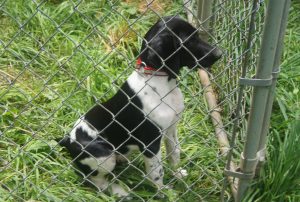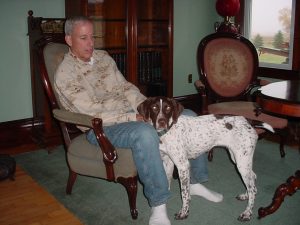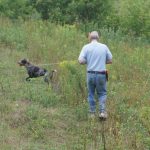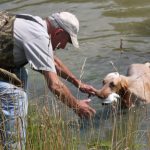The Magic Bond
POINTING DOG POINTERS May 2018
By Bob and Jody Iler
As owners of a bird dog kennel for many years, we’ve always had a number of dogs, keeping two in the house and the others in our kennel. Clients’ dogs in training live here at the kennel for one to three months, too, even if they are house dogs at home.
Over time, we’ve run the gamut of bird dog owners as well. Some come equipped with mattresses, blankets, treats, and toys for their pups. One woman was so distraught over the idea of leaving her “baby” in a kennel that we advised her it would be better to take her dog home, rather than put herself through such distress. Other clients come who routinely keep their dogs in outside kennels, believing that the less pampering the better in the making of a good bird dog. In fact, an old saying goes something like this: “You’ll ruin a good bird dog by letting him live in the house.”
So what do you think?
You can have a great pointing dog whether the dog lives in a kennel or with you in the house! If you stop by our house any given evening, you’ll find an English Pointer curled up in “his” recliner and an English Setter snuggled on the nearest lap. In past years, we’ve also had many pointing dogs living outside in our kennel, great bird dogs that got love, attention, and exercise each day.
Let’s take a look at the pros and cons.
Sometimes a fellow or gal who wants a hunting dog has to defer to his or her better half, who may not relish the idea of puppy training, clean-up, furniture chewing, and all the rest that goes with raising a pup indoors. Most couples both work and can’t leave a pup inside all day. Sometimes a spouse may have allergies to pet hair or reservations about “living with a dog.”
There are any number of good reasons why it might be better to keep pup in a well-constructed, safe, and sheltered kennel run with a warm, dry place for pup to get out of the weather and shade and ventilation in summer. With your dog in a proper outside kennel, you are also able to leave home for a longer period during the day than if you have to leave your pup in a crate inside your house.
But there are other things to consider. If your pup barks too much, close neighbors may complain. Dogs have been stolen out of outside kennels. When you are not home, dogs in kennels can be teased and taunted if their kennels can be accessed by passersby. Pups that grow up in a kennel without much socialization don’t get enough exposure to the outside world and can become “kennel-shy” and fearful of new and different situations. This can often translate into uncertainty and shyness in the field as well.
And without proper supervision, pups can get into trouble in outside runs. They can knock water containers over and be left without water on a hot day; they can chew dog houses and even chain link. Without a kennel run that has fencing laid underneath gravel, or a concrete base, dogs can dig out of a kennel. Some even learn to climb the fence enclosure and escape. Others, wearing a collar that is too loose, can come to a tragic end if the collar gets caught on something and chokes the pup.
And one other, but very important, consideration. The dog in the kennel is often forgotten after the initial period of excitement. He may be fed, watered, and kept comfortable, but he needs more than a pat at the end of a work day. He needs to bond with his owner and the only way that can happen is to spend time daily with pup. He looks forward to being with you! If you don’t have time for a dog, wait until you do before you get one. Having a dog is a commitment, especially a pointing dog that needs exercise and stimulation to develop.
Aside from the normal challenges of raising your pup as a house dog, there are lots of advantages to having your dog live with you.
Let’s start with health—both pup’s and yours. With your puppy inside the house, you are more aware of any health issues that may pop up that can often go unchecked longer when your dog is in a kennel. You can keep a closer eye out for irritated skin problems, cuts, ticks and other parasites, and eye and ear issues. You can teach pup to accept having her toenails trimmed and teeth and ears checked, and learn to enjoy being brushed.
As for you, few pills can match the “low blood pressure effect” of having a pup live with you. The laughter and joy in watching a puppy grow and experiencing pup’s unconditional love and trust is a tonic like no other. Being greeted like royalty at the end of a long and difficult day lifts the human spirit. Studies show that people who live alone benefit greatly from having a dog as a companion. And pointing dogs, with their abundance of energy, get us out of the house and into the field, with plenty of walks and runs in between to keep us both fit.
Pups that live with us learn house rules. With time, training, and patience, they become housebroken and can generally be taken anywhere reliably without having “accidents.” We had a great German Shorthair, Ranger, that was raised in the kennel. Early on, he liked to lift his leg at the doorway entrance to the vet’s office. Ranger was a smart dog, and in time, learned not to do this, but housebroken dogs usually don’t have these issues. They also learn what’s allowed and acceptable indoors, and what’s not. They learn the patterns of their owners’ lives, and share in the pleasure of an early morning walk or an afternoon nap together on the couch.
We’ve often discussed the importance of “reading your dog.” The dog that lives with you makes you her “case study.” She watches your eyes, your gestures, the way you speak and move. She quickly learns to read you, to know when you are happy or when you are sad.
That tremendous capacity for reading you, for looking into your very soul, is her gift to you. This helps you, in turn, to learn to read her. How does she show her feelings? Is her tail high and waving? Or tucked between her hind legs? Does she head out the door with enthusiasm? Or is she somewhat reserved? Does a stern reprimand make her cower? Or is she an irrepressible spirit that needs a little extra incentive to listen to your commands? Reading your dog is a challenge and an adventure, helping you to develop her as the best pointing dog she can be.
By becoming part of the fabric of our daily lives, our house dogs share a magic bond with us. This is an experience not to be missed by those of us who love dogs. If circumstances dictate that your dog must live in a kennel, that’s OK, too. With some extra effort, lots of love and attention, and long term commitment, your kennel dog can also share that magic bond with you.
Pointing Dog Pointers features monthly training tips by Bob and Jody Iler, who own Green Valley Kennels in Dubuque, Iowa. Bob and Jody have trained pointing dogs for over 35 years and have written many articles for The Pointing Dog Journal.







